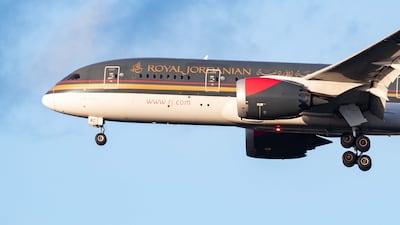Jordan's state airline Royal Jordanian is looking to expand its current fleet of Boeing 787s to 11 Dreamliners — from seven currently — over the next five years, its chief executive said.
The 787-8 jet operator is also planning to replace the older model with the newer 787-9 and 787-10 variants of the wide-body jet, Royal Jordanian boss Samer Al Majali said at a press conference during the Bahrain International Airshow on Wednesday.
“We will probably approach both the leasing market and Boeing for purchases on these aircraft,” he said.
“It's a problem of deliveries: we're actually quite rushed to be able to at least change our current fleet, let alone expand. The earliest you can get 787s is probably 2025 and we're trying to push harder, but not possible.”
This comes after the airline in October signed an initial pact with Brazil's Embraer to acquire 10 of the E2 regional jets, including the E190 and E195 variants, to serve short-haul routes in the Middle East. The airline also signed an agreement with Airbus to introduce 20 new A320 Neo family jets to its fleet.
“As we introduce the narrow-body and regional jet fleet, that allows us to provide a stronger feeder network that will support additional wide-bodies in the future,” he said.
On Wednesday, the airline selected engine maker Pratt and Whitney to power up to 30 of its coming Airbus A320 Neo-family jets and Embraer E-Jets E2 aircraft with geared turbofan engines.
Pratt and Whitney will also provide the airline with engine maintenance through a long-term service agreement.
Aircraft deliveries are expected to begin in late 2023.
“These aircraft will allow us to modernise our fleet and offer new routes, all while keeping airfare affordable and significantly reducing our carbon emissions,” Mr Al Majali said.
GTF-powered aircraft reduce fuel consumption and carbon emissions by between 16 per cent 20 per cent, NOx emissions by 50 per cent and noise by 75 per cent.
Certified for operation on 50 per cent sustainable aviation fuel (SAF) and successfully tested on 100 per cent SAF, GTF engines are capable of further reductions in carbon emissions, which will help the aviation industry meet its goal of net-zero emissions by 2050, Pratt and Whitney said in a statement.


